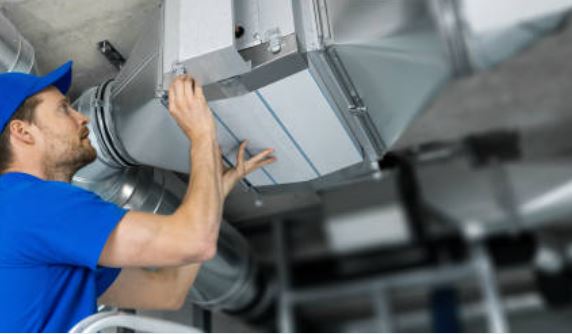Water cooler vs air conditioner…which is the best cooling gadget?
For a long time, homeowners have depended on air conditioners to cool their houses, especially during those hot summer days.

call 661-888-0248
Contact us 24/7 for HVAC services!
However, it is no secret that air conditioners are expensive to buy, install, and run. And this is why everybody is looking for an alternative.
Could water cooled units take over AC units? Do they have an excellent cooling capacity to be the ultimate cooling gadget?
Read ahead to find the comparison between the two and if water cooled units are worth buying.
Let’s go!
What are Water Cooler Units, and How do they Work?

“What is a water-cooled air conditioner?” is a common question many people ask.
This cooling system is often used in large corporations, schools, hospitals and homes. And as their name suggests, they use water in their cooling process.
The water-cooled unit cools the water to approximately 40-45 degrees Fahrenheit.
There are two major types of water cooling units you can choose from:
- chilled water system
- Cooling tower technology.
Chilled Water System
A chilled water system is usually installed on the roof or side of the building. The system cools the heat from the air before sending the chilled water throughout the facility.
This option is ideal for commercial buildings with a long or expanded layout. This is because the system allows the water to cool the building over a long distance.
Cooling Tower Technology
As its name suggests, the cooling tower technology runs cooled water over the hot condenser coils. The condenser coils retain the heat from the house and are cooled by the water.
They are efficient in cooling any building. You, however, have to keep adding water routinely to ensure it doesn’t run low.
How Do Chilled Water Systems Work?

Here are step by step details of how water cooling systems work.
- A centralized chiller plant absorbs the heat from the building through a compressor.
- Then, the condenser transfers heat to the evaporative cooler, where the heat can evaporate.
- Once the heat evaporates, the cool condenser water flows back into the chiller.
- The process repeats itself, keeping the room constantly cool.
What Are Some of the Benefits of Having a Water-Cooled Air Conditioner?

What are some of the reasons you should invest in water-cooled units?
First, water-cooled air conditioners are very beneficial for huge buildings. Using regular air conditioning in such huge buildings sometimes results in heat production rather than cool air.
Secondly, water-cooled units can cool several buildings or ample space without needing you to invest in additional units. You can cool the entire place of your house, including the garage, sunrooms, and basement, using a single water cooling unit.
Furthermore, water cooling systems can potentially save you some good money on cooling costs. They have a better ROI than air-cooled AC units due to their high energy efficiency(1). Your local air service tech can help you choose the best water-cooling units.
When to Use a Water Based Air Conditioner

Often, we get inquiries on when is the best time to use the water based air conditioner. And we answer that it depends on the system and the type of building. You will soon realize that water-cooled units can outperform AC units if you get this right.
Large Buildings and Facilities
Many large buildings that are bigger than residential spaces go well with water cooling.
One good reason is that you can cool a large building even with a small water cooling unit. This is because of their high energy efficiency and heat transfer rate. You will save loads of money in the long run.
On the contrary, if you have a huge space to cool, you will need a large air conditioning unit. And, the bigger the air conditioner or air cooler, the more expensive it is to buy, install, run and maintain.
Many times, homeowners try to take a short cut and invest in a smaller than they need air conditioning unit, in a bid to save money. With this, you will soon be looking for “air conditioner replacement near me”
For Single-Family Residences
Homeowners have another common question: “Can I have a water-cooled air conditioner in a small residence?”
Yes, you can. However, the benefits of water cooling diminish when installed in a smaller space. This is one of the reasons they are rarely installed in residential spaces.
Another reason they are rarely installed in residential spaces include:
- Water usage: water cooling uses a lot of water. This is incredibly impractical in dryer climates or if you experience water shortages.
- Maintenance: It is usual for water cooler condensers to scale. You, therefore, have to keep cleaning the mineral deposits to maintain your system in good working condition. The alternative is investing in de-mineralized water, which is also expensive.
Water Cooling vs Air Conditioner Specifics and Differences

Here are a few specifics of these two cooling gadgets. Understanding these will help you understand what works best for you.
Water cooling vs Air conditioner cost
Water cooled AC units cost more to install. If you have a lower upfront costs budget, you are better off selecting an air-cooled unit.
Also, with water-cooled AC units, you need a water source, which needs some maintenance.
Air conditioners need minimal AC maintenance services to water cooling units.
Water cooling vs Air Conditioner cooling capacity
The heat flux, film coefficient, and cooling consistency are up to 100 times more consistent with water cooling than with air-cooled AC.
This means that water cooled units will cool down hot air and pump out more cool air at a more constant and reliable rate.
The heat transfer properties of water are more efficient than that of air. This makes it a more efficient option than air conditioning.
Noise and Environmental Effect
The compressors of water-cooled AC units operate at a lower pressure than those of air-cooled units. This means that water cooling is quieter than air cooling.
Also, the Cooling Technology Institute has determined that water cooling is more environmentally friendly than standard AC units. This is because they are lower on gas emissions. Standard AC units use a chemical refrigerant, directly increasing their carbon footprint.
Water Cooling vs Air Conditioner: Cost of Running
“Are water-cooled units expensive to run?”
Mention water cooling to any homeowner, and they instantly think of elevated electricity and water consumption.
You want to keep in mind that this is not exactly the case. Water coolers recycle approximately 95% of the water(2). Just a minimal percentage of the water is eliminated from the system to eliminate impurities.
You, however, know that water-cooled systems need more attention and maintenance. We, however, think that this creates a balance because water cooling systems have a longer life span. Your water-cooled AC will run longer as long as you perform AC maintenance correctly.
Our Judgment: Water Cooling vs. Air Conditioner
For a long time, traditional air conditioning units have been considered conventional cooling gadgets.
However, it is crystal clear that water cooling can give air conditioners a run for their money.
Water cooling can change the game by lowering the cooling costs and increasing the cooling capacity.
We highly recommend water-cooled AC units for more significant commercial and residential buildings. The upfront installation charges will be high. However, the high cooling capacity and lower running costs will make it worthwhile.
However, if you have a medium-sized to a small residential space or office, you are better off with an air conditioner. Water coolers’ cooling capacity and energy efficiency reduce when the space is smaller. If you have a small space and you want to opt out of air conditioners, air coolers could be a good choice. Check out our air cooler vs air conditioner guide.
Water Cooler vs. Air conditioner Key Takeaways

Water Cooler Pros
- Highly energy efficient for large buildings,
- High cooling power,
- Quieter,
- Environment friendly as it uses no chemical cooling agent,
Water Cooling Cons
- Less energy efficient for small residential spaces,
- Costly to install.
Air Conditioner Pros
- less costly to install,
- appropriate for cooling residential spaces,
- does not require daily attention like water coolers,
- fresh air as it filters air too.
Cons
- Higher carbon footprint,
- high energy consumption.
Water Cooling vs. Air Condition Frequently Asked Questions

We answer some frequently asked questions on these two cooling methods below.
Is a water cooler better than AC?
For bigger buildings and homes, yes. For smaller buildings and residential spaces, an air conditioner is more efficient.
However, by comparison, water cooling is more efficient than air-cooled units. For air coolers, the efficiency depends on the temperature of the air being used in the system. A high ambient temperature translates to lower efficiency in the air-cooled chillers.
Are water-cooled air conditioners good?
They are, and they are worth your money too. You have to ensure you are getting the suitable model and size installed. You will enjoy high cooling capacity at lower costs with good operation and maintenance.
What are the disadvantages of water cooling?
Water coolers are expensive to install. You, therefore, have to have a high upfront budget. They also need frequent maintenance, more like daily attention, to ensure they are in good working condition. Also, the maintenance is good for prolonging the lifespan of the water cooler.
Final Thoughts
There we go for water cooling vs. air conditioner comparison.
To wrap it up, we would tell you to go for water cooling if you have a large home or looking for a cooling system for a commercial building. An air conditioning unit will work well for you for smaller buildings or small residential spaces.
If you have any more questions on water cooling vs. air conditioner, we would be glad to help you out.

call 661-888-0248
Contact us 24/7 for HVAC services!
Sources
https://www.bbc.com/future/article/20190822-are-there-alternatives-to-air-conditioning
https://www.energy.gov/energysaver/home-cooling-systems
